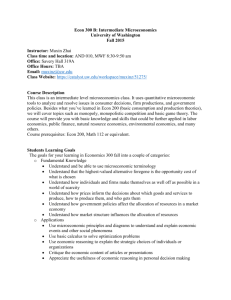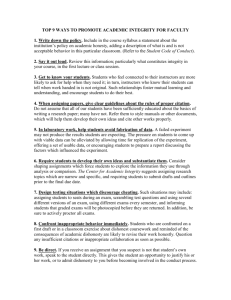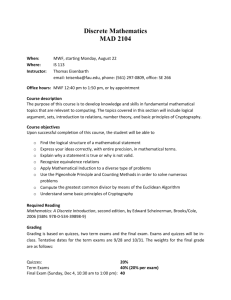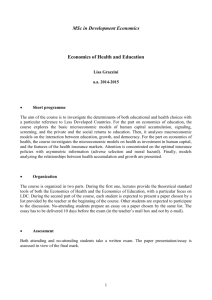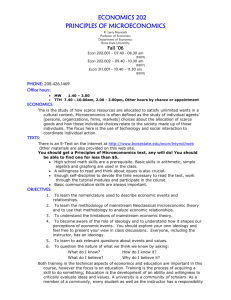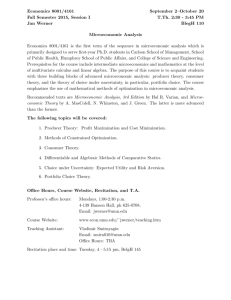Article Review
advertisement
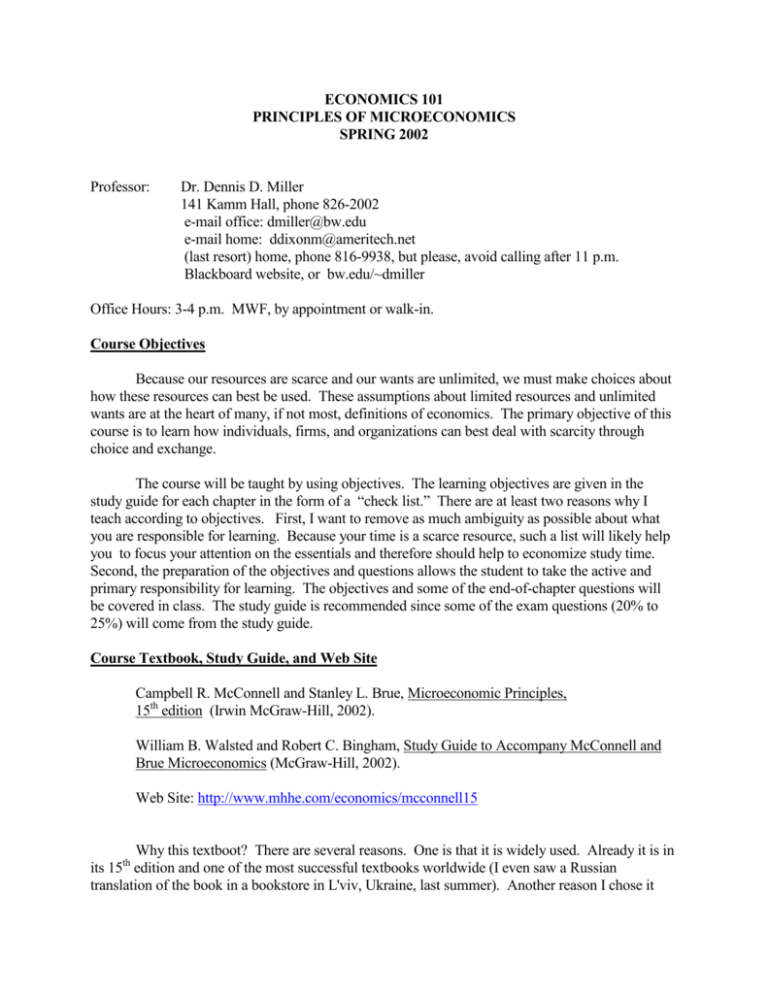
ECONOMICS 101 PRINCIPLES OF MICROECONOMICS SPRING 2002 Professor: Dr. Dennis D. Miller 141 Kamm Hall, phone 826-2002 e-mail office: dmiller@bw.edu e-mail home: ddixonm@ameritech.net (last resort) home, phone 816-9938, but please, avoid calling after 11 p.m. Blackboard website, or bw.edu/~dmiller Office Hours: 3-4 p.m. MWF, by appointment or walk-in. Course Objectives Because our resources are scarce and our wants are unlimited, we must make choices about how these resources can best be used. These assumptions about limited resources and unlimited wants are at the heart of many, if not most, definitions of economics. The primary objective of this course is to learn how individuals, firms, and organizations can best deal with scarcity through choice and exchange. The course will be taught by using objectives. The learning objectives are given in the study guide for each chapter in the form of a “check list.” There are at least two reasons why I teach according to objectives. First, I want to remove as much ambiguity as possible about what you are responsible for learning. Because your time is a scarce resource, such a list will likely help you to focus your attention on the essentials and therefore should help to economize study time. Second, the preparation of the objectives and questions allows the student to take the active and primary responsibility for learning. The objectives and some of the end-of-chapter questions will be covered in class. The study guide is recommended since some of the exam questions (20% to 25%) will come from the study guide. Course Textbook, Study Guide, and Web Site Campbell R. McConnell and Stanley L. Brue, Microeconomic Principles, 15th edition (Irwin McGraw-Hill, 2002). William B. Walsted and Robert C. Bingham, Study Guide to Accompany McConnell and Brue Microeconomics (McGraw-Hill, 2002). Web Site: http://www.mhhe.com/economics/mcconnell15 Why this textboot? There are several reasons. One is that it is widely used. Already it is in its 15th edition and one of the most successful textbooks worldwide (I even saw a Russian translation of the book in a bookstore in L'viv, Ukraine, last summer). Another reason I chose it was because of its highly technological features. I hope that you will use these to aid your understanding of the more traditional microeconomic course material. McConnell and Brue maintain a web page. The web page is quite extensive. It contains the following sections and topics: sample quizzes; Business Week articles; an economics graph kit; Wall Street Journal newsletter; Economics on the World Wide Web; Web questions by chapter; student discussion group; frequently asked questions; questions for Stan Brue (one of the authors); On-line Learning Center; Statistical Update, among others. Please use these features as your find them useful in learning about microeconomics Your first assignment will be to read the preface and first chapter of the book. Then, after you have read the chapter, immediately test your understanding by going through the checklist and taking the quiz at the web site. Academic Honesty Academic dishonesty will not be tolerated. Below is the college's policy towards academic dishonesty: "Policy on Academic Dishonesty Academic dishonesty is defined by the following three characteristics: 1. Claiming someone's work as your own--Examples include using answers from someone else's test or turning in a paper for which someone else did the research and/or writing; quoting from someone without acknowledging that you are quoting or giving the source of the quote. Plagiarism, using someone else's written or recorded words exactly, falls under this category. Plagiarism also include paraphrasing someone else's argument as you own; or presenting some else's line of thinking as your own. 2. Seeking unfair advantage over other students in taking a test or fulfilling an assignment--Examples of such behavior include copying from another student's paper or communicating with another student during an examination; allowing other students to copy from your exam paper; copying from notes secretly brought into an exam; copying another student's homework or allowing a student to copy yours; and securing a copy of an examination when other students taking the exam do not have, or are not allowed to have access to a copy. 3. Claiming for someone else what is, in fact, your own--An example would be signing the name of an academic advisor or any faculty or administrative person to an official form or document. If there is tangible evidence that a student has engaged in academic dishonesty, sanctions may be take against that student by an individual professor or by referring the student to either the Faculty/Student Problems Committee or the Student Judicial System (see the Student Handbook and/or Faculty Handbook for details."1 Should the student plagiarize or indulge in academic dishonesty I am likely to give a student zero points for the assignment. If the offense is plagiarism, I am likely to inform the person who has originally written the document of the offending student's theft. Student Evaluation Convention and the college require that you get a grade. You can control the grade that you earn in this course by choosing the degree of thoroughness you wish to learn the objectives, by fulfilling the class requirements, using the web facilities, and by studying the study guide. Your final grade will reflect the degree of your understanding of the subject. Your mastery of different objectives and the substance of the course in general will be evaluated using the following system of weights: Two midterm exams (20 points each I will double weight of the highest score) Final exam Article reviews Class preparation, homework, quizzes and participation 60 45 20 20 145 Your final grade will be according to the percentage of total points that you earn based on the above apportionment. For instance, if you earn 120 points of the total 145 then your grade will be [120/145 = 82.8] a B-. There are no extra credit assignments. The grading scales are the standard ones: Grade A+ A AB+ B BC+ C CD+ D 100% scale 96.7-100 93.4-96.6 90.0-93.3 86.7-89.9 83.4-86.6 80.0-83.3 76.7-79.9 73.4-76.6 70.0-73.3 66.7-69.9 63.4-66.6 4-point scale 4.0 4.0 3.667 3.333 3.0 2.667 2.333 2.0 1.667 1.333 1.0 Baldwin-Wallace College, "Section IV: Undergraduate Status and Policies," 2000-2002 Catalog: Baldwin-Wallace College, p. 31. 1 DF 60.0-63.3 less than 60 0.667 0.0 Article Review You will submit one or two article reviews. I MUST PRE-APPROVE THE ARTICLE(S) THAT YOU HAVE CHOSEN AND IT (THEY) MUST HAVE A PUBLICATION DATE WITHIN THE CURRENT SEMESTER, THAT IS, January 14 to May 3, 2002. This pre-approval is important because in the past some students have done poorly on the assignment because the article(s) they have chosen have contained insufficient microeconomic substance. (Indeed, some have mistakenly reviewed macroeconomic articles and received zeros on the assignment.) Reviews of articles that were published before the start of the quarter will not be accepted. Another reason for the pre-approval is to prevent you from reviewing an article someone else has chosen to review. The articles can be from almost any source as along as they have sufficient microeconomic content. You may be curious why I’ve required article reviews. There are several reasons. First, the exams tend to be mostly objective, involving problem solving and quantitative skills. The reviews help to balance the course in terms of its qualitative and quantitative components. Second, as in any discipline, communication of what you have learned is important. The reviews give you an opportunity to practice this communication through writing. Third, the reviews allow me another chance to check on your understanding of economic principles, on your ability to see the principles at work, and on your application of them to the real world examples. Fourth, by including this requirement, I am casting a larger net in trying to accommodate students who may have different learning styles that may not be favored by the other means of evaluation in the course. Two ratings will be given for each paper: one for content and the other for style. Both ratings will be of equal weight. I will hand out more complete guidelines for writing the reviews after the first midterm. Before then, I find that the student has a too limited understanding of microeconomic principles to either choose an article or to evaluate it. But for now I will mention that these reviews will be from 3 to 6 typewritten, double-spaced pages (roughly 750 to 1500 words) each, or more words if you like. Or, you may also choose to write just one, that is 6 or more pages in length (1500 or more words). Look through financial periodicals, e.g., Walls Street Journal, Businesss Week, Forbes, Fortune, etc., for articles to review. The articles will be graded according to neatness, readability, accuracy (that is, style), and the use of microeconomic analysis (content). I will collect them as you finish them until the final exam. After that, the grade on them will be reduced at the rate of 10 percent per day. Of course, there is a subjective component to grading these article reviews. If you merely do as required, you’ll likely receive an average grade, from 70-79; better than average, from 80-89; and if you go far beyond writing a good review, from 90-100. Class Preparation and Discretionary Points Class preparation is evaluated by daily responses to my questions mostly from the checklist. I will often choose at random students to discuss or explain an objective on the list. After I have selected two students and neither one has responded, I will answer the objective or question myself. Or, a student may volunteer (two points for correct answer, none for an incorrect answer). I will keep tally of your preparation. This makes up 10 points of your final grade. If I call upon you and you are present but fail to answer an item on the checklist, I will put a “1” on your card. If answer responsively, I will mark a "2" on your card. If your name is called and you are absent, I will mark a "0" on your card. At the end of the quarter, I will add up the total. Then I will array your scores. The highest ten percent of the students will get 10 points, the next highest 20 percent will receive an 8.5 points; the middle most clump of students (40%) will receive 7.5 points; the next lowest 20 % will receive 6.5 points, and the lowest 10% will receive, 5.5 points. Again, the purpose of this approach is to involve you directly in the learning process, allowing you to take the primary role in your own learning. If you need to come to the board to explain an objective, please do. I may also organize you in to groups to work on the checklist or questions at the end of some of the chapters. I will use the same rating system above to score individual (not group) participation. Note this well. Another 10 points will be available according to how your peers rank your contributions to class discussion and participation. This would include your willingness to volunteer answers, to raise interesting points, to ask helpful questions, to provide especially valuable insights, or to participate in group discussions and problem solving. At the end of the semester I will ask you to rank from 10 (the student contributing the most) to one the ten students that contributed most to class discussion than others. I will tally the scores and assign these five points as I did the participation points. Those who receive the scores that put them in the top quintile (20 percent) will receive all five points. Those in the second quintile will receive four points, etc. I will try to call on students and equal number times during the semester to make sure each student has an equal opportunity to respond. Of course, volunteering to answer questions is one way to make up for missed absences and wrong answers. Of course when you work in-groups, it will become apparent to you which of your classmates is prepared. This preparation will likely count when your peers rate your participation at the end of the semester. Exams may consist of a mixture of questions: true-false, multiple choice, problem solving, and essay. I hold you responsible for the material in the Student Guide, the textbook, handouts, and class lectures and discussions. My lectures will definitely have material not found in your textbooks. You are responsible for knowing the information that I impart through my lectures. Exams and assignments are to be taken and completed on time. Make-up exams and quizzes are likely to be a couple notches of difficulty harder than the original exam or quiz. This is intended to discourage missed exams or quizzes and to also account for the additional time students have had to study the material when they do make up the exam or quiz. Hints ---Do not fall behind. It's a new subject for most of you and some areas may need special attention to understand. Invariably, students who have taken economics in high school soon realize that the material in a college economics course is in much greater depth and detail than in high school. Since the course is cumulative, a weak preparation will make a weak finish. Seek help from me early if any difficulty arises. If the hours I have listed are inconvenient let me know and I will try to find a more convenient time. --Use the Study Guide. Some exam questions will be taken from it. Please ask questions. (As a friend one told me, it's better to appear ignorant once than to remain ignorant of something the rest of your life. Or according to an alleged Chinese proverb, “He who is afraid to ask, is ashamed of learning.” Or, yet another, “Education may be expensive, but the lack of education is even more expensive.”) --If you are having trouble, please consult me. Perhaps I can arrange a tutor, answer your questions, or give you some suggestions about how to study. --As in other spheres of life, what you get out this course is directly related to the effort and enthusiasm you put in to it. Only you can decide how much these will be. --Do ask questions. ["Questions are the engines of intellect, the cerebral machines which convert energy into motion, and curiosity to controlled inquiry."2--by David Hackett Fischer. Or, "The only dumb question is the one you had but failed to ask."--Anon. Or, "I'd rather appear dumb for an instant than be ignorant for a life time."--Larry Cross, a graduate school friend. Or, "He who is afraid to ask questions is a shamed of learning."--Supposedly a Chinese proverb.] Course Outline The following is subject to change. It is intended as a guide for your study. The subject material will be covered in the following order: Chapter 1: The Nature and Method of Economics Chapter 2: The Economizing Problem Chapter 3: Individual Markets: Demand and Supply Chapter 4: The Market System Chapter 5: The U.S. Economy Chapter 6: The United States in the Global Economy Likely exam here. Chapter 7: Demand and Supply: Elasticities and Applications Chapter 8: Consumer Behavior and Utility Maximization Chapter 9: The Costs of Production David Hackett Fisher, Historians' Fallacies: Toward Logic of Historical Thought (New York: Harper & Row, 1970) p. 3. 2 Likely exam here. Chapter 10: Pure Competition Chapter 11: Pure Monopoly Chapter 12: Monopolistic Competition and Oligopoly Choose three or more of the remaining chapters for two-thirds of the content of the final exam. (One-third of the final will be from earlier chapters. So, I would suggest that you review earlier material periodically.) After Chapter 12, I will likely ask you for your preferences about which of the remaining chapters you would like to cover. The above schedule is tentative and certainly subject to change. I will announce midterm exams at least one week in advance of upcoming examinations. FINAL : As noted above, two-thirds of the final will be over the most recent material covered and one-third will be from earlier material. Dates of final (Note well since I will refuse to give this information in class since it is given here). 8 a.m. MWF S01 class: Friday, May 10, 2002 at 9 a.m. to 11 a.m. 9:20 a.m. MWF S03 class: Wednesday, May 8, at 9 a.m. to 11 a.m. 10:40 a.m. MWF S04 class: Monday, May 6, at 9 a.m. to 11 a.m. I wish you the best in your study of the principles of microeconomics. If I can be of more help to meet any special needs, please let me know.
